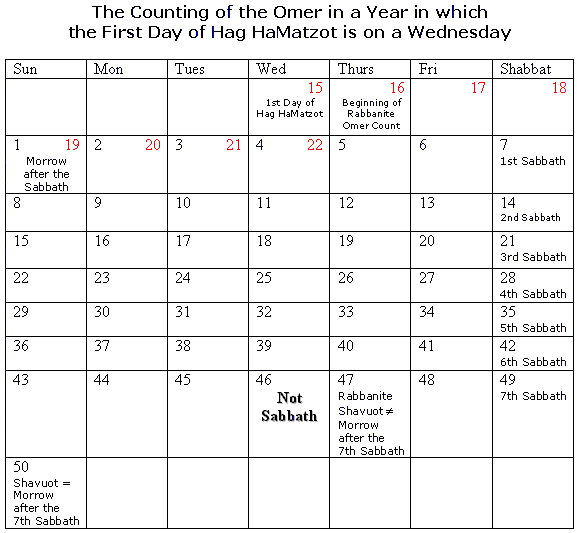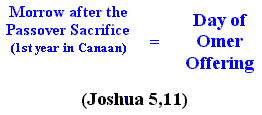Written by Nehemia Gordon

Hag Ha-Shavuot, is the second of the three annual Hagim [Pilgrimage-Festivals]
in the Hebrew Calendar and is known in English as the Feast of Weeks or
Pentecost. Shavuot is also referred to in the Torah as Hag HaKatzir (Feast
of Harvest) [Ex 23,16] and Yom HaBikurim (Day
of Firstfruits) [Nu 28,26]. In Post-Biblical times Shavuot was believed to
be the anniversary of the Revelation at Sinai, but there is no basis for this
in the Tanach (Hebrew Bible).1
When is
Shavuot?
Unlike all the
other Holidays in the Tanach, the Feast of Weeks is not given a fixed calendar
date but instead we are commanded to celebrate it at the end of a 50-day period
known as "The Counting of the Omer" (Shavuot being the 50th
day).2
The commencement of this 50-day period is marked by the bringing of the Omer
Offering in the Temple as we read, "And you shall count from the
morrow after the Sabbath from the day you bring the Omer [Sheaf] of Waving;
seven complete Sabbaths shall you count... until the morrow of the seventh
Sabbath you will count fifty days... and you shall proclaim on this very day,
it shall be a holy convocation for you " (Lev 23,15-16.21).
In late Second Temple times a debate arose between the
Boethusians and the Pharisees about whether the "morrow after the
Sabbath" [Heb. Mimohorat Ha-Shabbat] refers to the Sunday during
Hag HaMatzot [Feast of Unleavened Bread] or the second day of Hag HaMatzot
(i.e. the 16th of Nissan). Like the Boethusians and Ancient Israelites before
them, the Karaites count the 50 days of the Omer from the Sunday during Hag
HaMatzot and consequentially always celebrate Shavuot on a Sunday.

The
Rabbanites claim that in the phrase "the morrow after the Sabbath"
the "Sabbath" referred to is the first day of Hag HaMatzot. They
argue that this day is referred to as a Sabbath because work is forbidden on
it. However, the fact is that the Tanach never calls this day a Sabbath3
and if we look at the actual commandment in the Torah, this Rabbanite
interpretation is untenable. We are commanded in Lev 23,16
"Until the morrow after the seventh Sabbath shall you count fifty
days". While the first day of Hag HaMatzot could theoretically be called a
Sabbath there is no way the 49th day of the Omer could be called a
Sabbath, since (according to the Rabbanite theory) this day is neither a
holiday nor a Sabbath. This being so, in the Rabbanite reckoning the 50th day
of the Omer (=Shavuot) would NOT be on "the morrow after the
seventh Sabbath" as commanded in Lev 23,16.
Instead it would be on the morrow after the 7th Tuesday, Wednesday, or Thursday
or whatever day it happened to fall out after (see chart). The only way for the
49th day of the Omer to be a Sabbath, thereby making the 50th day "the
morrow after the Sabbath" as commanded in Lev 23,16,
is if the 1st day of the Omer is on a Sunday.

Another
passage, which indicates that the first day of the Omer has to be the Sunday
during Hag HaMatzot, is Joshua 5,11. This verse
reports the events surrounding the cessation of the Manna shortly after the
Children of Israel's entered into the Land of Canaan,
"And they ate of the produce of the land on the morrow after the Pesach
[sacrifice], Matzot and parched [barley] on this very day. And the Manna ceased
on the morrow when they ate of the produce of the land...".
As may be recalled, the Children of Israel were forbidden to eat of the new
crops until the day of the Omer Offering as we read in Lev 23,14
"And bread and parched [barley] and Carmel you will not eat until this
very day until you bring the sacrifice of your God; it shall be an eternal
statute for your generations in all you habitations." Clearly Josh 5,11, which describes the eating of "Matzot and parched
(barley)... on this very day" is a reference to the command in Lev 23,14
"And bread and parched (barley)... you will not eat until this very
day." (see diagram).

Thus
Joshua 5,11 is reporting that the first Omer Offering
in the Land of Israel was brought on the "morrow
after the Pesach [Sacrifice]" after which the Children of Israel were
permitted to eat of the produce of the land, which they immediately proceeded
to do.

When is
the "Morrow after the Pesach"?
When
was the "Morrow after the Pesach" in Joshua 5,11? It is important
to remember that in the Tanach the term Pessach [Passover] always refers to the
Passover Sacrifice while the holiday on which the sacrifice is brought is
called Hag HaMatzot (Feast of Unleavened Bread). So Joshua 5,11 is talking about the morrow after the Passover
Sacrifice. But when was this "morrow"? On the
morning of the 15th (i.e. the following morning) or the morning of the 16th.
The term Mimoharat, literally on the morrow, means on the
following morning. The expression "Morrow after the Sabbath"
refers to Sunday morning, because the Sabbath is a 24-hour event ending on
Saturday night and Sunday morning is the morning which follows (see diagram).
Similarly, the "Morrow after the Pesach [sacrifice]" must be the
morning immediately following the Pesach sacrifice. Remembering that the
Pesach Sacrifice was brought on the end of the 14th of Nissan at twilight (cf.
Ex 12,18; Dt 16,4), the following morning is the
morning of the 15th (see diagram).


This
deduction is confirmed by Nu 33,3, which relates
"And they traveled from Ramses in the first month on the 15th of the
month; on the morrow after the Pesach [sacrifice] the Children of Israel went
out with a high hand in the eyes of all Egypt." The above passage
describes the day of the Exodus both as the 15th of the first month and
as the Morrow after the Pesach Sacrifice. This verse conclusively shows
that the "Morrow after the Pesach [sacrifice]" is equivalent to the
morning of the 15th of Nissan!

Returning
to Joshua 5,11, we have seen that in the year Israel entered Canaan
the Omer Offering was brought on the "Morrow after the Pesach
[Sacrifice]" which we now have established is the morning of the 15th of
Nissan. Apparently in that year the 14th of Nissan fell out on a Sabbath and
the 15th of Nissan fell out on a Sunday (since the Wave Sheaf offering is always
brought on a Sunday). The Rabbanite theory that the Omer Offering is brought on
the 16th of Nissan is clearly refuted by the above passage, for in the year
that the Children of Israel entered Canaan the
Children of Israel brought the Omer Offering on the 15th of Nissan and not the
16th!

The
above also answers another seemingly difficult question, namely, does the Omer
count begin with the Sunday during Hag HaMatzot or the Sunday after the Sabbath
during Hag HaMatzot. Essentially, the question is what part of the phrase
"the morrow after the Sabbath" must fall out during Hag HaMatzot, "the
morrow" or "the Sabbath"? The only ramification of
this semantic quandary is when the 15th of Nissan falls out on a Sunday. In
this instance, is the Omer Offering brought on the 15th of Nissan (morrow is
during Hag HaMatzot) or the 22nd (Sabbath is during Hag HaMatzot)? The evidence
from Josh 5,11 and Nu 33,3 provide a precedent which
clarifies this situation since in the year the Children of Israel entered Canaan the 15th of Nissan actually fell out on a Sunday
and the Omer Offering was brought on the 15th of Nissan, not the 22nd!
Notes:
Note 1: The Revelation at Sinai did
occur towards the beginning of the Third Month (Sivan) and Shavuot always falls
out towards the beginning of the third month. Like Shavuot, the exact date of
the Revelation of Sinai is not specified,and it is
tempting to connect the two. However, it is important to remember that the
connection between the two events is never made in the Tanach and as it is
written, "You shall not add to the word which I command you, neither shall
you diminish from it, in order that you will keep the commandments of YHWH your
God which I command you." (Dt 4,2).
Note 2: The name "Counting of the
Omer" for the period between the Omer Offering and Feast of Weeks does not
appear in the Tanach and is used here by common convention.
Note 3: It is worth noting that Yom
Kippur is the only other day besides the weekly Sabbath, which is also referred
to as a Sabbath. The weekly Sabbath is referred to as YHWH's Sabbath
["Today is a Sabbath of YHWH" (Ex 16,25);
"Keep My Sabbaths" (Lev 19,3)] while Yom Kippur is referred to
as Israel's
Sabbath ["It shall be a Sabbath of restfulness for you" (Lev
16,31; 23,32)]. The Sabbatical Year (Shemitah) is also called the
Sabbath of YHWH (Lev 24,4-5). It is also worth noting
the term Shabbaton, which is used to describe some of the Holy Days. It should
be emphasized that the term Shabbaton is not the exact equivalent of Sabbath [Shabbat]
nor is it ever used interchangeably with it. Indeed, the term Shabbaton is
derived from the same root as Sabbath although its exact connotation is unclear.
Shabbaton seems to be the adjective form of the word Sabbath and means
something like "Restfulness" or "rest-period". Thus the
weekly Sabbath is described as a Shabbat Shabbaton, meaning a
"Sabbath of Restfulness". Similarly, the 7th year is called a Shenat
Shabbaton, meaning a "Year of Restfulness" (usually translated
"Sabbatical Year"). The term Shabbaton is also applied to Yom Teruah (Lev 23,24), the first day of Sukkot (Lev 23,39), and Shemini Atseret (8th Day of
Sukkot) (Lev 23,39). The terms Sabbath and Shabbaton are never used to describe
any of the days of Hag HaMatzot nor are ANY of the Holy Days ever called a
Sabbath other than the weekly Sabbath itself. The only exception is Yom Kippur
which is the holiest day of the year on which even eating is forbidden. In
contrast, on the Holy Days of Hag HaMatzot (1st and 7th days) it is permissible
to cook and have fire (Exodus 12,16).